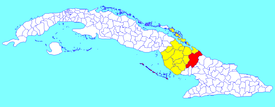Guáimaro
| Guáimaro | |
|---|---|
| Municipality | |
 Guáimaro municipality (red) within Camagüey Province (yellow) and Cuba |
|
| Location of Guáimaro in Cuba | |
| Coordinates: 21°03′32″N 77°20′52″W / 21.05889°N 77.34778°WCoordinates: 21°03′32″N 77°20′52″W / 21.05889°N 77.34778°W | |
| Country |
|
| Province | Camagüey |
| Established | 1924 |
| Area | |
| • Total | 1,847 km2 (713 sq mi) |
| Elevation | 80 m (260 ft) |
| Population (2004) | |
| • Total | 57,086 |
| • Density | 30.9/km2 (80/sq mi) |
| Time zone | EST (UTC-5) |
| Area code(s) | +53-322 |
| Climate | Aw |
Guáimaro is a town and municipality in the southern part of Camagüey Province in Cuba. It is located between the cities of Camagüey and Las Tunas.
Guáimaro features prominently in Cuban history as the place where in 1869 the Revolutionary Army of Mambises met and created the Constitution for a new nation free from Spanish colonial oppression. The municipality was created in 1943, when it split from Camagüey.
The municipality is divided into the barrios of Camaniguán, Elia, Galbis, Guáimaro, Palo Seco, Pilar and Tetuán.
In 2004, the municipality of Guáimaro had a population of 57,086. With a total area of 1,847 km2 (713 sq mi), it has a population density of 30.9/km2 (80/sq mi).
...
Wikipedia

